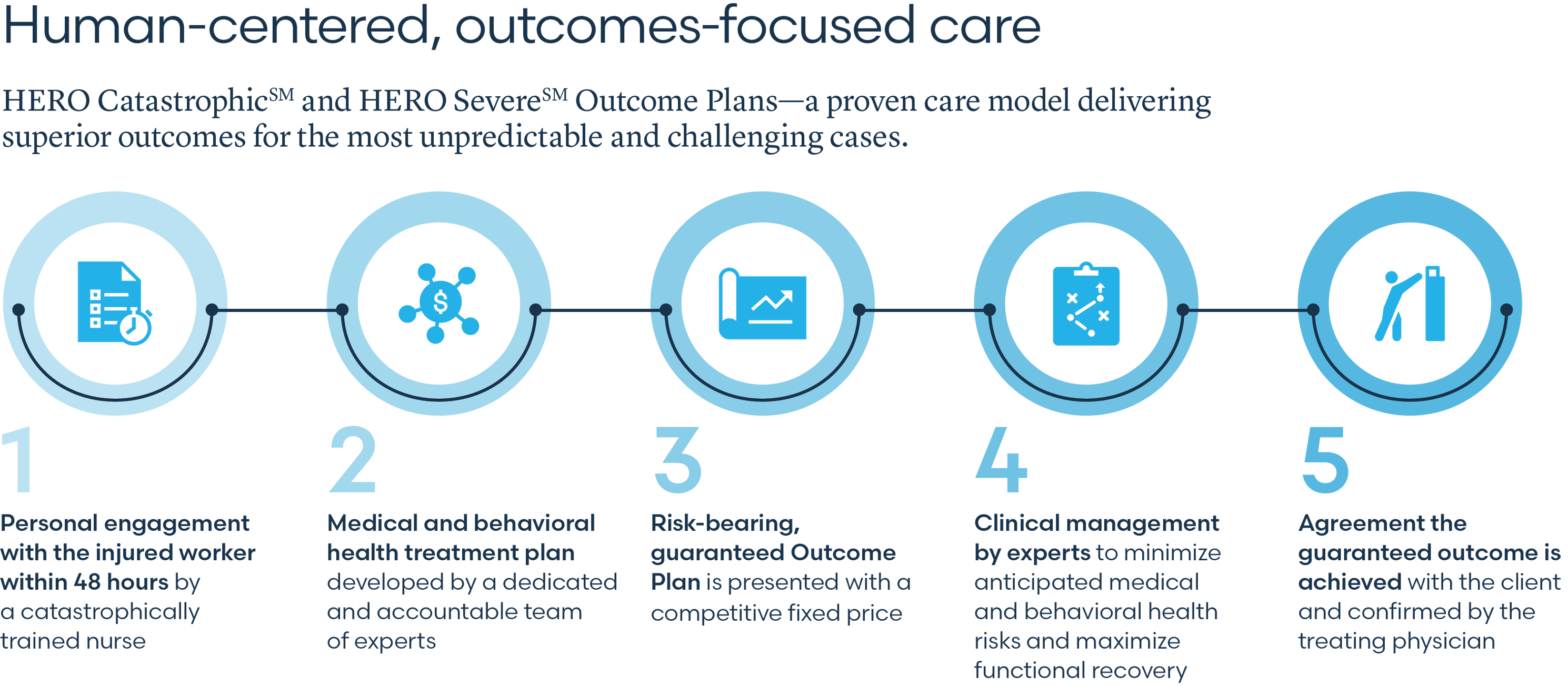WorkCompWire
Full article on: workcompwire.com
The complexity and volatility of catastrophic and severe injuries require substantial administrative workloads and focused expert management to achieve a successful recovery. A seriously injured worker can expect to see 60 medical providers across 100 appointments during the first year, with almost a third needing long-term care.1 For many employers and plan administrators, the highly complicated and multifaceted treatment process required for these cases means a significant financial investment and major questions concerning resources and direction of care.
For more than 30 years, the industry has turned to Paradigm to provide certainty for the most uncertain and challenging workplace injury cases. Paradigm has established the model for provable, life-changing outcomes based on its Systematic Care Management ModelSM, which includes clinical and behavioral excellence, with risk transfer for financial assurance, and the expertise to measure and consistently prove guaranteed outcomes.
1. Integration of Medical and Behavioral Expertise
Catastrophically injured workers need the support of a full team of specialized clinicians to guide and coordinate the extremely high level of care it takes for a positive recovery and return to maximum function. “Nurse generalists and non-specialized physician consultants are not enough for catastrophic cases,” says Michael Choo, MD, Paradigm Chief Medical Officer. “The clinicians at Paradigm are specialized medical and behavioral experts who are truly committed to our approach and foster relationships with the top practitioners and research organizations in their respective fields.”
Every single case at Paradigm is assigned a cross-functional team of clinical experts—the Paradigm Management Team. Each team consists of a nurse (Paradigm Network Manager), physicians (Paradigm Medical Directors), and clinical specialists specifically matched to each injured worker, who have received dedicated catastrophic injury training and completed mandatory continuing education requirements. Along with direct medical expertise, severe injury and rehabilitation management decisions are guided by a data set containing more than 20,000 catastrophic cases and evidence-based treatment projections to achieve optimal outcomes and efficient resource utilization.

The most serious injuries also bring a specific set of psychological, behavioral, emotional, and social challenges to entire families that can become obstacles to recovery without focused attention. “Paradigm believes medical expertise and behavioral health expertise working together cohesively are vital to the recovery process for seriously injured workers,” says Deborah M. Benson, PhD, ABPP, Vice President of Clinical Solutions for Paradigm. For more than a decade and a half, Dr. Benson has been a guiding force for developing the expert-driven Paradigm model for behavioral care.
The behavioral health professionals—including board-certified psychiatrists and neuropsychiatrists, psychologists and neuropsychologists, rehabilitation counselors, and applied behavior analysts—are integrated into the Paradigm Management Teams to provide vital support, coping strategies, and resources to injured workers and their families. Each case benefits from assessments at inception and individualized care plans designed to promote positive adjustment and proactively address potential barriers to recovery.
By developing a comprehensive method for physical and behavioral recovery, Paradigm is the standard setter for catastrophic and severe injury care management in the workers’ compensation industry and beyond. “The emphasis Paradigm places on outcomes, the development of evidence-based treatment plans, and the collaboration with interdisciplinary treatment teams—including behavioral health networks—is one that can and should serve as a model for general health care,” says Paradigm Medical Director David B. Arciniegas, MD, Immediate Past Chair of the International Brain Injury Association and current President of the American Neuropsychiatric Association.
2. True Medical Risk Transfer and Fixed Costs
Paradigm delivers clinical solutions backed by the best medical and behavioral health experts in their respective fields and in the workers’ compensation industry and risk management sector. This expertise works in tandem with a risk transfer and competitive pricing model that delivers value and certainty for payers.
Paradigm’s value-driven approach addresses the financial, administrative, and outcome uncertainties associated with catastrophic cases head on with accountable risk transfer. This means Paradigm assumes the risk of volatile catastrophic and severe claims, while delivering financial assurance through fixed pricing for early and accurate medical reserving and guaranteed functional and clinical outcomes.
Kathy Galia, Chief Clinical Solutions Officer for Paradigm, explains, “Paradigm is the only true risk transfer company—we assume the risk until we achieve a verifiable and mutually agreed-upon outcome with the client and the injured worker’s treating physician.” She continues, “Because these are cases that have a long tail and are highly volatile, stakeholders need to accurately predict lifetime claim cost and length.” Medical risk transfer and fixed costs enable Paradigm clients to accurately set medical cost reserves and allocate administrative resources where they are best needed.

3. Paradigm Outcomes
Paradigm and proven superior outcomes have always been closely connected, starting with the organization’s identity. “We began as Paradigm OutcomesTM in 1991 to provide a much-needed focus on catastrophic workplace injuries and achieve guaranteed outcomes for these exceptionally challenging cases,” explains Dr. Choo. “The ability to actually deliver on this promise has required consistent dedication to client service, clinical excellence, data curation, results measurement, and process improvement over the past 30-plus years.”
Paradigm Outcomes may have evolved to Paradigm in name, but the commitment to measuring and articulating managed care service outcomes has remained fundamental. Paradigm’s data and analytics teams and clinical leaders regularly collaborate on quality assurance and to verify outcome claims. This includes commissioning independent studies measured against industry benchmarks and developing rigorous internal metrics in the circumstances where broader data is not yet available. Today, Paradigm Outcomes has come to represent Paradigm’s aptitude for quantifying financial, clinical, and service performance results with unwavering focus on returning catastrophically injured workers to their communities, families, and meaningful work.
Additionally, Paradigm Outcome Plans deliver life-changing results for any client, with certainty and confidence. This includes fixed-cost, medical risk transfer contracts—HERO CatastrophicSM and HERO SevereSM Outcome Plans—with guaranteed outcomes for the widest range of injuries, and Complex Large Loss Plans for complex older claims benefiting from time-based risk transfer contracts.
For Galia, the core elements of Paradigm come together in products that bring certainty and life-changing results to everyone involved. “Holistically, Paradigm’s clinical, behavioral, and data expertise, combined with an emphasis on risk transfer and quality metrics, translates to pricing confidence and long-term savings, including 32% lower lifetime medical costs and nearly six times higher return-to-work rates, compared to industry benchmarks.”2

Refer a case today: referrals.paradigmcorp.com
Sources:
- Paradigm data
- Milliman Complex and Catastrophic Workers’ Compensation Claims Cost Analysis for Paradigm—October 2020
- Paradigm completed Outcome Plans with end year 2022